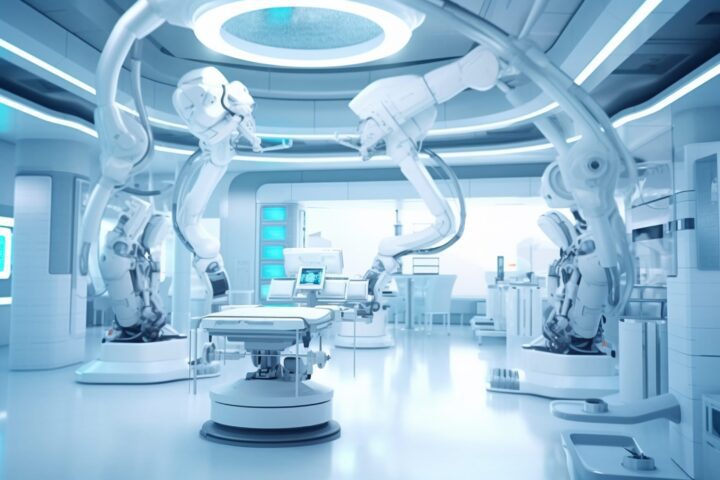Artificial intelligence is no longer a buzzword, a technology of today; it is right from education—the art of acquiring occupational training—to things that mold every other aspect of our lives. It has grasped the innovative waves surrounding medical education and reshaped conventional methodologies of traditional teaching to develop new methods.
The following paper discusses how AI might influence medical education through the discussion of the benefits and challenges that may arise to determine what could be expected in the future.
What is AI?
Artificial intelligence: In other words, AI is the development of those machines or systems that think intelligently, like human intelligence, by learning from data, understanding natural language, and making decisions. AI in medical education will help with simulation, personalized learning, and a number of educational tasks.


Application of AI in Medical Education
- Intelligent tutoring systems: AI helps in the provision of each student with individual tutoring and feedback.
- Simulation-Based Training: The work of AI is in the creation of virtual medical simulations on which the students can practice. Predictive Analytics: It scans the data about every particular student in predicting their future performances and what a student may improve on.
- NLP: AI reads through all the texts about medicine and uses the information for providing learning support.
- Enhancing Personalised Learning: Perhaps the most deep-reaching impacts of AI on medical education relate to customized learning. Historically, medicine has always used a one-size-fits-all approach in training that does not account for the learning needs of each individual student or ways of learning.


Adaptive Learning Systems
- Personalised Content: AI makes the learning content tailored to the performance of every single student. If a student falters in some particular topic, then additional resources or explanations get attached in those areas.
- Paced Learning: AI can adjust the pace of dissemination of content. Those who catch on faster will move to the next step, while for those who are slower, a review of concepts can be done at one’s convenience.
Real-Time Feedback
- Instant Corrections: Artificial intelligence provides immediate feedback through quizzes and exercises where, instantly, mistakes can be improved by students for better understanding of the concept.
- Detailed Insights: AI has the capability to bring forward areas where a student may lag behind, hence providing focused suggestions for improvement.


Customised Assessments
Focused Testing: The AI intelligence creates tests regarding the progress of a particular student. It focuses the tests in areas where the student needs more practice. It monitors AI from time to time the students’ progress and changes the learning path accordingly. Personal learning through AI makes it effective since one’s needs and improvement in understanding are put into consideration.
Continuous Learning and Professional Development Facilitation
The graduation date does not mark the end of medical learning, but continuous learning is required since there is continuous development within the field. AI also facilitates lifelong learning for health professionals.
- Personalised Learning Pathways: AI suggests what learning material a professional needs to go through, considering his present skill level and competence to keep education appropriate and efficient.
- Targeted Courses: AI identifies weaknesses in courses one should take extra courses in and makes recommendations on the courses or material. Microlearning
- Bite-Sized Modules: AI can provide really short, focused modules of learning that will fit within a busy schedule. The topics or skills in such modules would be narrow; hence, continuous learning will be less painful.
- Flexible Learning: Microlearning supports professionals in learning at their convenience and thus finding time for education within an extremely busy lifestyle.
- Knowledge in Real Time: AI continuously screens present research and new medical literature regarding changing and emerging treatments, guidelines, and trends.
- Access in an Instant: Physicians will have instant access to the latest on these matters in order to better place themselves with state-of-the-art knowledge. It furthers their endeavors at improving collaboration and better dissemination of knowledge amongst physician colleagues and partners.
There is even a need for collaboration and sharing of knowledge within medical education. AI makes this better through the development of platforms and tools that bring educators, students, and professionals together.


Virtual Learning Communities
AI has made it very easy to implement virtual learning communities among medical students and professionals where they can discuss cases, share knowledge, and consult.
- Speciality Groups: specialty-based grouping for the connectivity of its members in their niche.
- AI Knowledge Base: The big database, with a huge repository of medical knowledge, research works, case presentations, and treatment policies, will be done through AI in such a manner that access to information shall take place via functions of AI that are indexed and categorized.
AI is going to get even better with collaboration and information sharing—from the very platforms that connect people to effective structuring of information.


Future of AI in Medical Education and Training
Its use in the future can only be envisioned to change how medical education and training have thus far been undertaken in more exciting ways.
Integration with Other Technologies
- AI and VR: A mix of artificial intelligence with VR can propose more realistic simulations and training.
- AI and Genomics: A combination of AI with genomic data has presented opportunities in personalization based on genetic knowledge.
In conclusion, the future of AI in medical education is very bright for more effectiveness, personalization, and collaboration in the learning environment that ultimately leads to better health outcomes.
It has much influence in medical education and training, both pre- and post-training, in many forms: better personalized learning, improved simulation-based training, and continuous learning support in collaboration. In fact, AI is already reforming how doctors are being educated and trained.



































Wonderful beat ! I wish to apprentice even as you amend your site, how can i subscribe for a blog web site? The account helped me a acceptable deal. I have been tiny bit familiar of this your broadcast offered shiny transparent idea
whoah this blog is wonderful i like studying your articles. Keep up the great work! You already know, lots of individuals are looking around for this information, you could help them greatly.